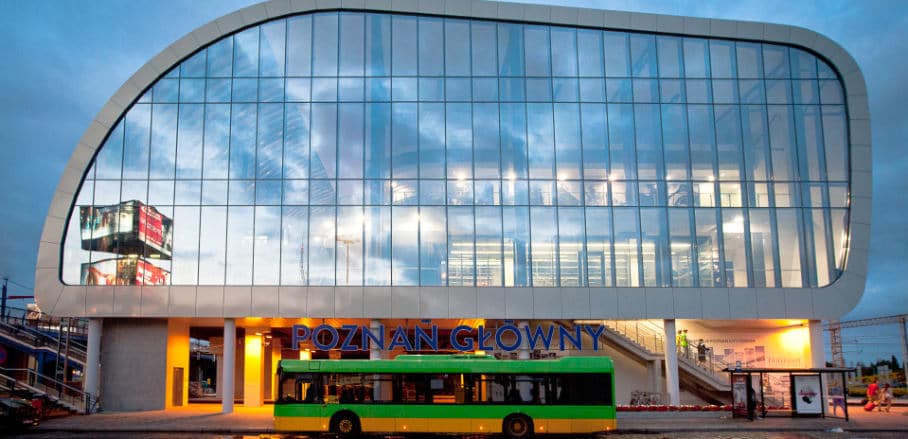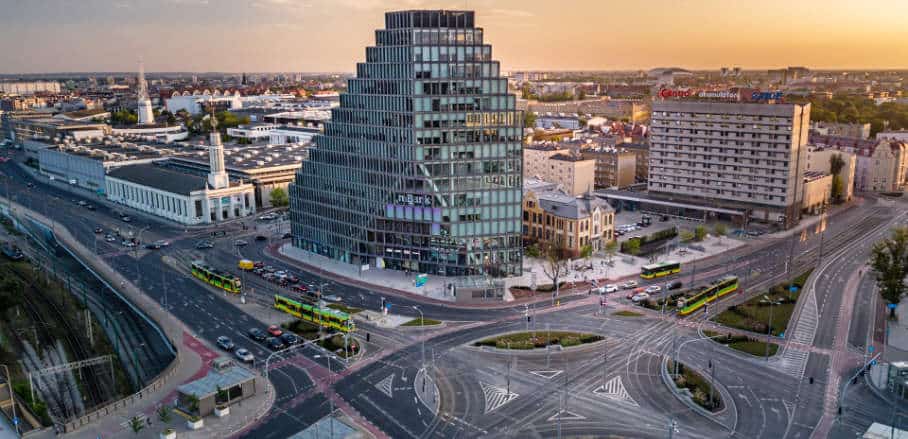How to Build the Intelligent City of Tomorrow
Citizens everywhere are increasingly demanding that their cities become more ‘intelligent’ and intuitive. Michal Lakomski, Director of Digitalisation and Cybersecurity of the City of Poznań, on building the smart city of tomorrow.
Modern public services available online, that you can use 24 hours a day, from your own home, sitting on the couch with your laptop or a smartphone in your hand? A public “office on the phone” would be an undeniable advantage for every city that wants to meet the growing technological needs of its citizens! But what makes a city intelligent?
An intelligent city is a next-generation city that uses advanced information and communication technologies to improve the quality of life for its citizens. It does this by unlocking the potential of social capital and by actively involving citizens in the process of building and developing smart solutions to urban challenges. Our award-winning Smart City Poznań Model is an excellent example of such an innovative approach. It focuses on three key themes: quality, savings (of time, energy, and space, as examples), and pragmatics. We are interested in universal solutions and in ideas that will be beneficial for all social groups and stakeholders.

Poznań @ Poznań City Hall
Four Criteria of a Smart City
To face the challenge of building a next-generation city, the interdisciplinary Smart City Poznań Team was established. We set out to identify six key interrelated areas in our city: Smart Living, Smart Economy, Smart Environment, Smart Community, Smart Mobility, and Smart Digital City. Defining what constitutes a “smart project” proved to be a challenge. To start with, we made an in-depth analysis of ongoing and planned projects in Poznań and selected those which met certain smart city criteria. We agreed that a project can be qualified as smart if it meets at least two of these four criteria:
- integrative: ensures that data flows smoothly and can be integrated;
- innovative: deals with something that has never been done before and as such is defined as innovative, new, unique or improved
- inclusive: engages other departments/entities from outside City Hall, such as public and private entities, residents, NGOs; and
- technologically advanced: makes use of technological tools to support processes.
In addition, we believe that a well-functioning smart city is all about well-prepared structures and about limiting silos, i.e., the tendency for certain groups to close themselves in silos. It is a city organism that interrelates and cooperates. Thus, we need to constantly work to make the cooperation between departments and city organisational units as well as local companies better and more effective. And it should be remembered that the very structures of our city include more than thirty departments, several hundred organisational units, and many city companies! A holistic view of the city is therefore essential at every stage of planning and implementing new smart projects.
What Does E-Administration Look Like?
To provide a modern administrative service, we always need to take two aspects into account: the user (the citizen) and the back-office (what happens inside the office). The aim should be to develop both components in a balanced way. Of course, we need to focus on the needs of our citizens, but we also need to develop solutions that provide value. Similarly, we should offer solutions that are appealing to our citizens and exciting for them to use.

Poznań @ Poznań City Hall
Modern services are characterised by progressive automation and robotisation. Certain processes can be carried out without the need of a human clerk, shortening the response times and making processes faster and smoother. A perfect example of this is a voice bot, which supports the operation of our city hotline. In Poznań, we’re also planning to implement a voice bot that books appointments for citizens at the city hall. At the same time, new services must not be dehumanising. We are not trying to eradicate physical visits to City Hall. Instead, we are trying to supplement them or make City Hall simply more accessible for everyone.
Another good example is the “Friendly Declarations” implemented in Poznań. This is a set of online forms that allow citizens to complete their tax returns in a way that’s faster and easier than ever before. The user is supported by algorithms that guide them through the process so that they are unable to make mistakes.
Cybersecurity
In striving for modern e-administration that operates on fast, easy, and understandable principles, we need to support ourselves with technology to achieve this. That leads us to the topic of cybersecurity. Digitalisation has revealed a whole new set of challenges that need to be addressed. For example, we need a new team of qualified staff and separate funding. Data protection is also a challenge. In the traditional model, we lock our data files in a closet. With online services, it’s not so simple! Instead, we need to implement appropriate procedures to ensure the security of our processed data.
We are making progress, but there’s much more to be done, and our services can certainly be extended and improved. Here, we can take some inspiration from the banking sector. The level of computerisation makes the modern bank primarily an IT system and a banking application, rather than a majestic building in the city centre. However, we’ve reached one important milestone. When creating a new service, we put digitalisation in the foreground, rather than add it as an afterthought! We strongly believe this is one of the most indispensable ingredients for building the intelligent city of tomorrow.
- Intelligent and Inclusive: The Smart City of Poznań - 17. February 2022
- How to Build the Intelligent City of Tomorrow - 15. February 2022
